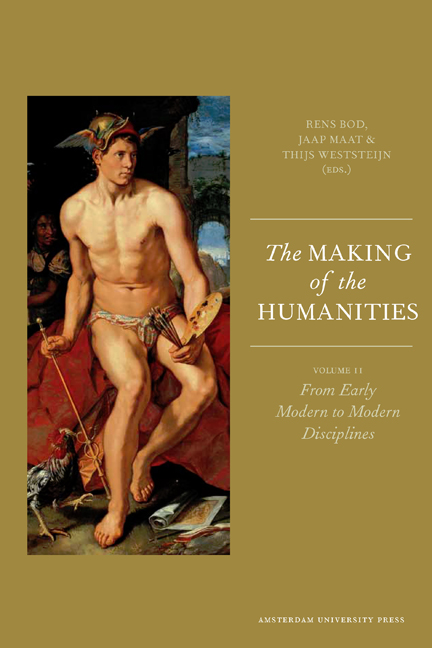Book contents
- Frontmatter
- Contents
- Introduction: The Dawn of the Modern Humanities
- I Linguistics and Philology
- II The Humanities and the Sciences
- III Writing History and Intellectual History
- IV The Impact of the East
- V Artworks and Texts
- VI Literature and Rhetoric
- VII Academic Communities
- Contributors
- List of Figures
- Index
Fact and Fancy in Nineteenth-Century Historiography and Fiction: The Case of Macaulay and Roidis
Published online by Cambridge University Press: 19 January 2021
- Frontmatter
- Contents
- Introduction: The Dawn of the Modern Humanities
- I Linguistics and Philology
- II The Humanities and the Sciences
- III Writing History and Intellectual History
- IV The Impact of the East
- V Artworks and Texts
- VI Literature and Rhetoric
- VII Academic Communities
- Contributors
- List of Figures
- Index
Summary
Every ‘zone of contact’, in Bakhtin's terms, is a grey territory open to the interplay of a variety of genres and forms of discourse. The understanding and representation of reality has been a zone between the competing disciplines of historiography and fiction. As a result, the defining space between the two has been slippery. As Angela Keane and many others before her have observed, this ambivalence about the limits and domains of these two disciplines was mirrored in the crisis about historical representation in the early nineteenth century, when the ‘Romantic models of literary production […] disturbed this always fragile equilibrium and produced an ethical and representational dilemma for historiographers’. In order to investigate deeper into this intricate relationship during the making of the humanities in the nineteenth century, I examine the work of two contemporary writers: the English historian Thomas Babington Macaulay and the Modern Greek novelist Emmanouil Roidis. My choice is not random because both writers experimented with the uses of fiction in history and with the possibilities of interweaving narrative order with historical fact. On the one hand, Macaulay, with his History of England (1848-1861), wanted to give to history those attractions which had been usurped by fiction and wished to supersede ‘the last fashionable novel on the tables of young ladies’. On the other hand, Roidis, in his Pope Joan (1866), an alleged ‘medieval study’ that examined the story of the purported she- Pope who ruled Christendom in the middle of the ninth century, ingeniously combined history and legend, as well as brilliant wit, only to unmask the illusion of verisimilitude on which realist fiction is based. Bearing this in mind, it comes as no surprise that Macaulay's work aroused Roidis’ interest to such an extent that he undertook the prodigious task of translating it into Greek. When Roidis’ translation of Macaulay's History was published in 1898, thirty-two years separated the writing of this translation's preface from his Pope Joan. Some of Macaulay's views on the writing of history, as distilled in Roidis’ preface of the work, bear a striking resemblance to the ideas that Roidis, many years earlier, had himself expounded in the preface and the introduction to his Pope Joan.
- Type
- Chapter
- Information
- The Making of the HumanitiesVolume II: From Early Modern to Modern Disciplines, pp. 149 - 166Publisher: Amsterdam University PressPrint publication year: 2012



